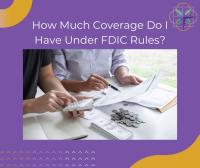Inflation-proof Your Money: Strategies to Safeguard Your Financial Future
Posted by and Written by Danette Lowe, CFP® on Tue, 10/31/2023 - 18:29
In this article we're going to talk about inflation, its causes, what the Federal Reserve is doing about it, and most importantly, strategies for protecting our finances during these periods of high inflation.
What is inflation and what causes it?
Inflation is the rate at which the general level of prices for goods and services is rising. It affects us all in different ways, and we may not always be aware of it. For example, the costs of medical care or the costs of education tend to rise at a much higher rate than regular consumer goods inflation.
One of the biggest pressures on inflation is wages. About 70% of the expenses of a corporation are due to payroll. We’ve been at historically low levels of unemployment, meaning high levels of employment. Read More...
How Much Coverage Do I Have Under FDIC Rules?
Posted by Presented Danette Lowe, CFP® on Fri, 04/28/2023 - 16:37
When you walk into your local bank, you often see a sign that says “Each depositor insured to at least $250,000”. FDIC-insured banks must display this sign in their branch per FDIC rules.1 But what is the Federal Deposit Insurance Corporation (FDIC) and by how much does it insure your deposits? Because of the recent bank failures and panic that ensued, it is important to fully understand whether and how your accounts are covered.
To do so, let’s discuss...
Retire with Confidence: 9 Mistakes to Avoid in Your Financial Planning
Posted by and Written by Danette G. Lowe, CFP® on Fri, 03/31/2023 - 00:56
Are you planning for your retirement? Many people make common financial planning mistakes that can jeopardize their retirement goals. In this article, we'll discuss 9 common financial planning mistakes and how to avoid them. By learning from these mistakes, you can create a solid retirement plan and avoid costly missteps along the way.
The Power of Planning: 5 Key Benefits of Having a Financial Plan
Posted by and Written by Danette G. Lowe, CFP® Danette Lowe on Thu, 03/16/2023 - 17:33
Are you thinking about retirement? It's never too early (or too late) to start planning your financial future. A comprehensive financial plan can help you achieve your goals, reduce financial stress, increase your financial security, maximize your investment returns, and improve your overall financial well-being. In this article, we'll explore the five key benefits of having a financial plan and the six steps in the financial planning process that will help you achieve these benefits. So, if you're ready to take control of your financial future and make your dreams a reality, read on!
A financial plan is a comprehensive strategy that considers all aspects of your financial life, including budgeting, saving, investing, and retirement planning. In this article, we'll explore the five key benefits of having a financial plan and the six steps in the financial planning process that will help you achieve these benefits.
From Savvy Saver to Loving Legacy: The Important Ages in Your Financial Life
Posted by and Written by Danette G. Lowe, CFP® on Fri, 03/03/2023 - 18:18

From Savvy Saver to Loving Legacy: The Important Ages in Your Financial Life
Understanding the important stages in your financial life is essential for anyone who wants to make smart financial decisions and achieve your long-term goals.
By knowing what to expect at each stage of life, you can prepare for unexpected expenses, plan for retirement, and leave a lasting legacy for your loved ones.
Whether you're a Savvy Saver just starting out or a Loving Legacy individual enjoying retirement, this article will provide valuable insights into the key financial milestones to keep in mind throughout your journey.
Where are you on your financial journey?
Wherever you are on your journey, it's important to understand that different ages and stages of life bring different financial challenges and opportunities.
Over the years, I’ve developed a few key terms to help describe the various stages:
- Savvy Savers
- Ready to Retire
- Loving Legacy
We'll also discuss how major life events, or "Life Quakes," can impact a person's financial journey at any point along the way.
Income Tax Blunders to Avoid in 2023
Posted by and Written by Danette G. Lowe, CFP® on Thu, 02/16/2023 - 14:29
The most common mistakes Income Tax mistakes usually result in a simple lack of understanding of the consequences of our decisions. We simply didn’t know that the Tax Implications were so large or could have been avoided. In this article, we’ll cover three common tax mistakes and how to avoid them.
If you don’t like paying taxes, then this article is for you.
First Look at The Secure Act 2.0: NEW Retirement Planning Strategies
Posted by and Written by Danette G. Lowe, CFP® on Mon, 01/23/2023 - 16:16
The Secure Act 2.0 also known as the Securing a Strong Retirement Act was signed into law on December 29, 2022. The Secure Act 2.0 is a follow up to the Secure Act 1.0 passed in January of 2020. This new Secure Act 2.0 contains over 4,000 pages of new legislation with major changes affecting businesses and individuals. Here’s a first look at 4 key pieces of information that will benefit you right now:
- The New RMD age increases from 72 to 73 in 2024.
- A brand-new option for surviving spouses that affects today’s withdrawal strategies.
- Employer sponsored plan updates like student loan matching for 401(k)’s and penalty free emergency savings withdrawals.
- An update to the 10-year rule for those who Inherited an IRA in 2020 or later.
9 Ways To Teach Your Kids About Money
Posted by and Written by Danette G. Lowe, CFP® on Tue, 01/10/2023 - 14:18
Whether we realize it or not, our kids learn by observing what we do. They see us spend money at the grocery store, and they see us spend money when they're going back to school shopping. They see money when they get their monthly allowance, but most of the time, they observe us spending money, so we need to teach our kids how to handle money wisely.
5 Key Metrics to Track for An Epic Early Retirement
Posted by and Written by Danette G. Lowe, CFP® on Thu, 01/05/2023 - 11:26
There are five factors we strongly recommend you consider before you put your early retirement plans in place. If you already know about the FIRE movement (Financial Independence Retire Early) and are keen to get in on the action and plan your early retirement, then keep reading and tune in to watch the full episode on YouTube: https://youtu.be/PGdkbUG03hw!
If you're pursuing early retirement as a goal, you need to get precise with numbers — we would consider early retirement to be giving up work before the age of 60. Of course, you might have another number in mind, but in terms of retirement income planning and making retirement savings, 60 is the magic number we have in mind.
How To Set Financial Goals For Success In 2023
Posted by Tiahney Wildman on Fri, 12/16/2022 - 21:01
With a new year just around the corner, most people habitually start thinking about goals. We all do it, don't we? While our goals don't have to start on January 1, it's a natural time to evaluate and start anew.
Even if you haven't been consciously thinking about your own goals, chances are, they've been creeping up in your mind. It's time to dive in and get those goals out in the open and make things happen.
Goal setting, especially setting financial goals, can be intimidating, frustrating, and time-consuming, and oftentimes, we just put it off because we get overwhelmed.
Why do we get so emotional about it? Because we don't have a plan - a step-by-step guide to help us navigate through the process. Setting financial goals is easier when it's broken down into manageable "bite-size" pieces.










